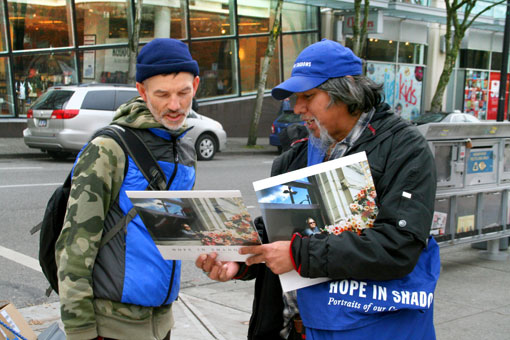See below for photos of Vancouver’s Downtown Eastside community from the Pivot Legal/Hope in Shadows annual photography contest.
Pivot Legal Society is not your ordinary public interest law firm. The Vancouver-based nonprofit organization with a staff of seven focuses on a single troubled neighborhood—the Downtown Eastside (DTES), an impoverished and marginalized community of 15,000. Employing strategic litigation to achieve legal reform and social impact, Pivot Legal takes a decidedly progressive approach to the issues that most affect local residents. The DTES was once the transit, commercial and cultural center of Canada’s largest West Coast city, but is now home to a disproportionate number of displaced First Nations people, individuals with mental health issues, drug addicts, sex workers, and women fleeing violence. “We take a really radical position on some very controversial issues,” says Katrina Pacey, Pivot Legal’s litigation director.
Pivot Legal was founded in 2000 by John Richardson, then a recent law graduate working for an environmental advocacy group in the DTES, to campaign against what community residents felt were the most egregious violations of their rights. The organization focused initially on police harassment and lack of police accountability, and later added violence against sex workers, homelessness, inadequate health services, drug policy, and justice for youth to its list of campaigns. It successfully sparked a formal audit of the police complaints process in British Columbia, won a suit against the city of Vancouver for failing to enforce a bylaw guaranteeing the upkeep of affordable housing units, and collected affidavits from nearly 100 sex workers as evidence in a constitutional challenge to prostitution laws.
Pivot Legal has been particularly active in the area of federal drug policy. It advocates treating drug addiction in Canada as a public health issue rather than a crime, and has defended needle exchange programs, health contact centers for drug users and supervised injection sites. Though it did not provide direct legal counsel on the case, Pivot Legal helped secure a Supreme Court victory in 2011 defending the right of InSite, the first and only supervised drug injection facility in North America, to keep its doors open in the DTES.
“The InSite decision was a huge win for us,” explains Pacey. “It entrenches a constitutional right to supervised injection facilities in communities where there is a population of drug users.” Pivot Legal hopes the decision will pave the way for similar services across Canada and the U.S., and plans to continue advancing the drug policy conversation. Based on the results of a recent study, it has begun focusing on new heroin-assisted therapy for patients with opium addictions.
Another very visible arm of Pivot Legal’s work is the Hope in Shadows program, which began in 2003. Every summer, Pivot Legal staff and volunteers hand out 200 disposable cameras for DTES residents to document their community. Of the 4,000 photographs submitted, approximately 40 are enlarged and exhibited, and 12 selected via community-wide vote for the Hope in Shadows calendar. The calendar raises money as well as awareness—Pacey refers to Hope in Shadows as “a huge relationship builder” for Pivot Legal—and also serves as an employment tool. About 200 DTES residents receive training in basic sales and marketing and a street vendor’s license to sell the calendars. In 2010, vendors earned $135,000 altogether (a $10 profit per $20 calendar).
“It’s not just about the money,” says Paul Ryan, program director for Hope in Shadows. “It’s the confidence and the self-esteem that people get [that helps them] go up to the next stage in their life.” And, adds Pacey, it provides an opportunity for the broader DTES community “to engage with people they would otherwise walk past as panhandlers on the street.”
Pivot Legal is not slowing down. With additional campaigns to decriminalize adult prostitution, reform the child protection system and establish a constitutional right to housing—all at the federal level—the organization’s docket remains full. “We are so not done with the work we originally set out to do,” says Pacey.
All photos courtesy of the Pivot Legal Society.






